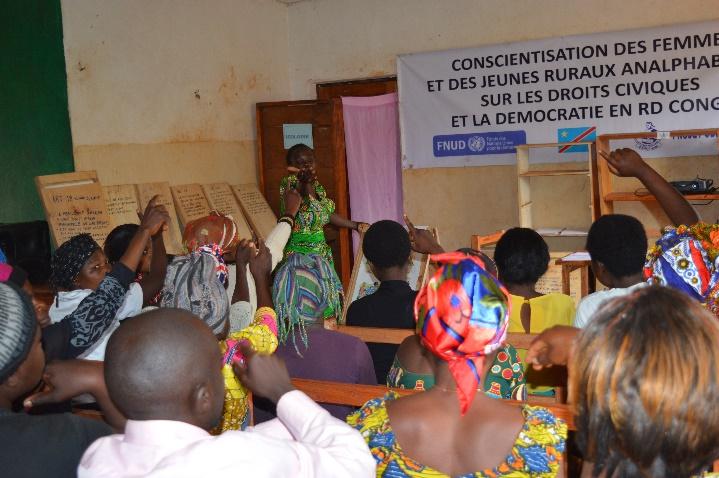Building literacy and participation among women and youth in DRC





The Democratic Republic of Congo's work towards peace and democracy after decades of conflict was manifested in elections held in 2006 and 2011. Now, elections are due again before the end of 2017. Recurring peace and security challenges and the sheer size of the country present particular issues in ensuring all citizens are able to vote. An UNDEF-funded project works to mobilize rural women and youth in the Walungu territory of South Kivu, where it is estimated that about 60 per cent of rural youth and 80 per cent of rural women are illiterate.
The project, implemented by Centre d’Actions Sociales pour le Développement Intérgré, works on strategies to engage citizens through the use of local languages and dialects, so as to build tailored resources for access to information for illiterate groups. A community-based pool of master trainers and facilitators engages women and youth to put into practice what they have learned.
In November 2016, a mobilization session in Bideka, near the borders to Rwanda and Burundi, sensitized illiterate groups on key articles of the Constitution and electoral law. Role play, theatre techniques, image boxes, and video materials were used in an interactive way to educate participants on complex concepts such as the accountability that elected leaders have towards their constituents, the role of observers and the media in electoral processes, and the civic duty to vote. The session also addressed fundamental rights, the presumption of innocence, and sexual violence protection.
The women and youth will take ownership of their role as citizens by organizing into pressure groups and interest clubs, and proposing and implementing their own advocacy micro-projects. Local authorities and community leaders are being engaged at all stages of the project, with the double benefit of providing women and youth with a direct communication channel to decision-makers, while at the same time engaging officials in more inclusive and responsive governance.


